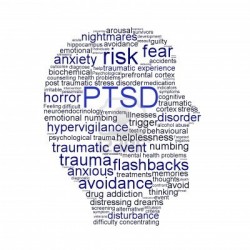PTSD doubles the rates of addiction: Early detection is important for a healthy life
“Posttraumatic Stress Disorder (PTSD) is an anxiety disorder that can occur after you have been through a traumatic event. A traumatic event is something horrible and scary that you see or that happens to you. During this type of event, you think that your life or others’ lives are in danger. You may feel afraid or feel that you have no control over what is happening.” (WebMD)
A report shows that 45 percent of people with post-traumatic stress disorder (PTSD) smoke cigarettes, 52 percent have been diagnosed with alcohol abuse or dependence, and 35 percent have been diagnosed with drug abuse or dependence.
The smoking rate among people with PTSD is about double that of the general population, as is the rate of alcohol abuse and dependence. The drug addiction and dependence rate is almost three times that of the general adult population. (jointogether.org)

PTSD is a type of mental health disorder that is caused by a traumatic event.
Fort Wayne anesthesiologist William Pond, M.D., knows soldiers bring a part of war home with them. He sees first hand how the effects of war can impact the whole family.
Dr. Pond, a colonel in the Air National Guard, has served four tours in Iraq. He believes physicians can help returning troops and their families by being aware of the psychiatric disorders they may suffer. A Rand Corporation study released last April revealed nearly 20 percent of returning soldiers reported symptoms of PTSD, but only half sought treatment. Soldiers who did seek help for PTSD or major depression received minimally adequate treatment for their illnesses, according to researchers. Those who did not seek help said they were concerned that it would threaten their military careers. (ismanet.com)
Early treatment is better because symptoms of PTSD may get worse. Dealing with them now might help stop them from getting worse in the future.
PTSD symptoms can change family life because PTSD symptoms can get in the way of your family life. You may find that you pull away from loved ones, are not able to get along with people, or that you are angry or even violent.
PTSD can be related to other health problems and can worsen physical health problems. Illnesses such as Chronic pain, autoimmune disease and thyroid disease and musculoskeletal conditions. (helpguide.org)
Symptoms
Post-traumatic stress disorder symptoms are commonly grouped into three types: intrusive memories, avoidance and numbing, and increased anxiety or emotional arousal (hyperarousal).
Symptoms of intrusive memories may include:
- Flashbacks, or reliving the traumatic event for minutes or even days at a time
- Upsetting dreams about the traumatic event
- Symptoms of avoidance and emotional numbing may include:
- Trying to avoid thinking or talking about the traumatic event
- Feeling emotionally numb
- Avoiding activities you once enjoyed
Symptoms of anxiety and increased emotional arousal may include:
- Irritability or anger
- Self-destructive behavior, such as drinking too much
- Trouble sleeping
- Being easily startled or frightened
- Hearing or seeing things that aren’t there
source: Baltimore Examiner
